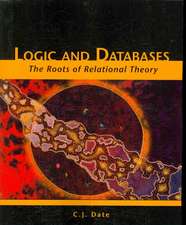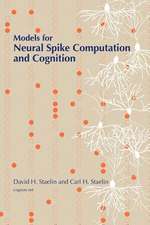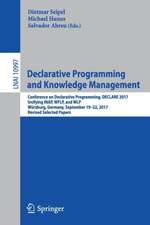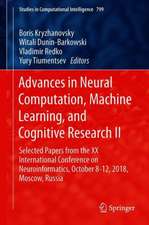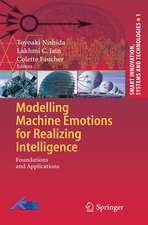Advances in Culturally-Aware Intelligent Systems and in Cross-Cultural Psychological Studies: Intelligent Systems Reference Library, cartea 134
Editat de Colette Faucheren Limba Engleză Hardback – 23 noi 2017
In this era of globalization, people from different countries and cultures have the opportunity to interact directly or indirectly in a wide variety of contexts. Despite differences in their ways of thinking and reasoning, their behaviors, their values, lifestyles, customs and habits, languages, religions – in a word, their cultures – they must be able to collaborate on projects, to understand each other’s views, to communicate in such a way that they don’t offend each other, to anticipate the effects of their actions on others, and so on. As such, it is of primary importance to understand how culture affects people’s mental activities, such as perception, interpretation, reasoning, emotion and behavior, in order to anticipate possible misunderstandings due to differences in handling the same situation, and to try and resolve them. Artificial Intelligence, and more specifically, the field of Intelligent Systems design, aims at building systems that mimic the behavior of human beings in order to complete tasks more efficiently than humans could by themselves. Consequently, in the last decade, experts and scholars in the field of Intelligent Systems have been increasingly tackling the notion of cultural awareness. A Culturally-Aware Intelligent System can be defined as a system where Culture-related or, more generally, socio-cultural information is modeled and used to design the human-machine interface, or to provide support with the task carried out by the system, be it reasoning, simulation or any other task involving cultural knowledge.
| Toate formatele și edițiile | Preț | Express |
|---|---|---|
| Paperback (1) | 610.34 lei 38-44 zile | |
| Springer International Publishing – sep 2018 | 610.34 lei 38-44 zile | |
| Hardback (1) | 661.47 lei 6-8 săpt. | |
| Springer International Publishing – 23 noi 2017 | 661.47 lei 6-8 săpt. |
Din seria Intelligent Systems Reference Library
- 20%
 Preț: 1050.57 lei
Preț: 1050.57 lei - 20%
 Preț: 1157.60 lei
Preț: 1157.60 lei - 20%
 Preț: 648.44 lei
Preț: 648.44 lei - 20%
 Preț: 650.08 lei
Preț: 650.08 lei - 20%
 Preț: 1005.64 lei
Preț: 1005.64 lei - 20%
 Preț: 1052.67 lei
Preț: 1052.67 lei - 20%
 Preț: 1171.46 lei
Preț: 1171.46 lei - 20%
 Preț: 1164.84 lei
Preț: 1164.84 lei - 20%
 Preț: 815.83 lei
Preț: 815.83 lei - 20%
 Preț: 989.96 lei
Preț: 989.96 lei - 20%
 Preț: 1063.41 lei
Preț: 1063.41 lei - 20%
 Preț: 504.37 lei
Preț: 504.37 lei - 18%
 Preț: 1113.26 lei
Preț: 1113.26 lei - 20%
 Preț: 1920.04 lei
Preț: 1920.04 lei - 20%
 Preț: 990.62 lei
Preț: 990.62 lei - 20%
 Preț: 651.57 lei
Preț: 651.57 lei - 20%
 Preț: 645.97 lei
Preț: 645.97 lei - 20%
 Preț: 660.16 lei
Preț: 660.16 lei - 20%
 Preț: 647.13 lei
Preț: 647.13 lei - 20%
 Preț: 654.05 lei
Preț: 654.05 lei - 20%
 Preț: 649.93 lei
Preț: 649.93 lei - 20%
 Preț: 648.11 lei
Preț: 648.11 lei - 20%
 Preț: 657.99 lei
Preț: 657.99 lei - 20%
 Preț: 656.84 lei
Preț: 656.84 lei - 20%
 Preț: 1624.04 lei
Preț: 1624.04 lei - 20%
 Preț: 642.98 lei
Preț: 642.98 lei - 20%
 Preț: 649.60 lei
Preț: 649.60 lei - 20%
 Preț: 651.23 lei
Preț: 651.23 lei - 20%
 Preț: 653.06 lei
Preț: 653.06 lei - 20%
 Preț: 1002.99 lei
Preț: 1002.99 lei - 20%
 Preț: 645.14 lei
Preț: 645.14 lei - 20%
 Preț: 658.33 lei
Preț: 658.33 lei - 20%
 Preț: 644.98 lei
Preț: 644.98 lei - 20%
 Preț: 646.62 lei
Preț: 646.62 lei - 20%
 Preț: 654.21 lei
Preț: 654.21 lei
Preț: 661.47 lei
Preț vechi: 826.83 lei
-20% Nou
Puncte Express: 992
Preț estimativ în valută:
126.58€ • 131.36$ • 105.80£
126.58€ • 131.36$ • 105.80£
Carte tipărită la comandă
Livrare economică 17-31 martie
Preluare comenzi: 021 569.72.76
Specificații
ISBN-13: 9783319670225
ISBN-10: 3319670220
Pagini: 459
Ilustrații: XXVIII, 459 p. 68 illus., 49 illus. in color.
Dimensiuni: 155 x 235 mm
Greutate: 0.86 kg
Ediția:1st ed. 2018
Editura: Springer International Publishing
Colecția Springer
Seria Intelligent Systems Reference Library
Locul publicării:Cham, Switzerland
ISBN-10: 3319670220
Pagini: 459
Ilustrații: XXVIII, 459 p. 68 illus., 49 illus. in color.
Dimensiuni: 155 x 235 mm
Greutate: 0.86 kg
Ediția:1st ed. 2018
Editura: Springer International Publishing
Colecția Springer
Seria Intelligent Systems Reference Library
Locul publicării:Cham, Switzerland
Cuprins
Introduction.- Culturally-Aware HCI Systems.- Building Time-Affordable Cultural Ontologies using an Emic Approach .- Teaching an Australian Aboriginal Knowledge.- Culturally-Aware Healthcare Systems.- Combining a Data-driven and a Theory-based Approaches to Generate Culture dependent Behaviours for Virtual Characters.- Mental Activity and Culture: The Elusive Real World.- Affective Body Movements (for Robots) Across Cultures.- Modeling Cultural and Personality Biases in Decision-Making.- Modeling Cultural and Personality Biases in Decision-Making.
Textul de pe ultima copertă
This book offers valuable new insights into the design of culturally-aware systems. In its first part, it is devoted to presenting selected Culturally-Aware Intelligent Systems devised in the field of Artificial Intelligence and its second part consists of two sub-parts that offer a source of inspiration for building modelizations of Culture and of its influence on the human mind and behavior, to be used in new Culturally-Aware Intelligent Systems. Those sub-parts present the results of experiments conducted in two fields that study Culture and its influence on the human mind’s functions: Cultural Neuroscience and Cross-Cultural Psychology.
In this era of globalization, people from different countries and cultures have the opportunity to interact directly or indirectly in a wide variety of contexts. Despite differences in their ways of thinking and reasoning, their behaviors, their values, lifestyles, customs and habits, languages, religions – in a word, their cultures – they must be able to collaborate on projects, to understand each other’s views, to communicate in such a way that they don’t offend each other, to anticipate the effects of their actions on others, and so on. As such, it is of primary importance to understand how culture affects people’s mental activities, such as perception, interpretation, reasoning, emotion and behavior, in order to anticipate possible misunderstandings due to differences in handling the same situation, and to try and resolve them.Artificial Intelligence, and more specifically, the field of Intelligent Systems design, aims at building systems that mimic the behavior of human beings in order to complete tasks more efficiently than humans could by themselves. Consequently, in the last decade, experts and scholars in the field of Intelligent Systems have been increasingly tackling the notion of cultural awareness. A Culturally-Aware Intelligent System can be defined as a system where Culture-related or, more generally, socio-cultural information is modeled and used to design the human-machine interface, or to provide support with the task carried out by the system, be it reasoning, simulation or any other task involving cultural knowledge.
In this era of globalization, people from different countries and cultures have the opportunity to interact directly or indirectly in a wide variety of contexts. Despite differences in their ways of thinking and reasoning, their behaviors, their values, lifestyles, customs and habits, languages, religions – in a word, their cultures – they must be able to collaborate on projects, to understand each other’s views, to communicate in such a way that they don’t offend each other, to anticipate the effects of their actions on others, and so on. As such, it is of primary importance to understand how culture affects people’s mental activities, such as perception, interpretation, reasoning, emotion and behavior, in order to anticipate possible misunderstandings due to differences in handling the same situation, and to try and resolve them.Artificial Intelligence, and more specifically, the field of Intelligent Systems design, aims at building systems that mimic the behavior of human beings in order to complete tasks more efficiently than humans could by themselves. Consequently, in the last decade, experts and scholars in the field of Intelligent Systems have been increasingly tackling the notion of cultural awareness. A Culturally-Aware Intelligent System can be defined as a system where Culture-related or, more generally, socio-cultural information is modeled and used to design the human-machine interface, or to provide support with the task carried out by the system, be it reasoning, simulation or any other task involving cultural knowledge.
Caracteristici
Offers valuable new insights into the design of culturally-aware systems Presents recent research on culture-aware intelligent tutoring systems, culturally-aware educational systems, and cross-cultural decision-making support systems Presents solutions and sound methods for integrating a complex set of diverse behavioral models and modeling techniques Includes supplementary material: sn.pub/extras


